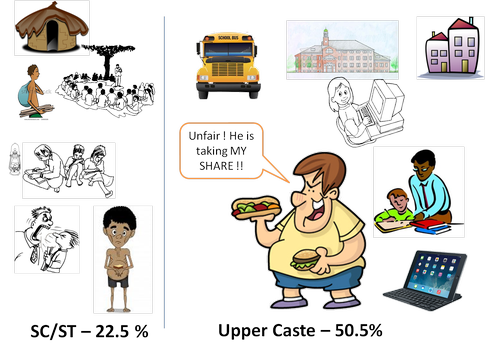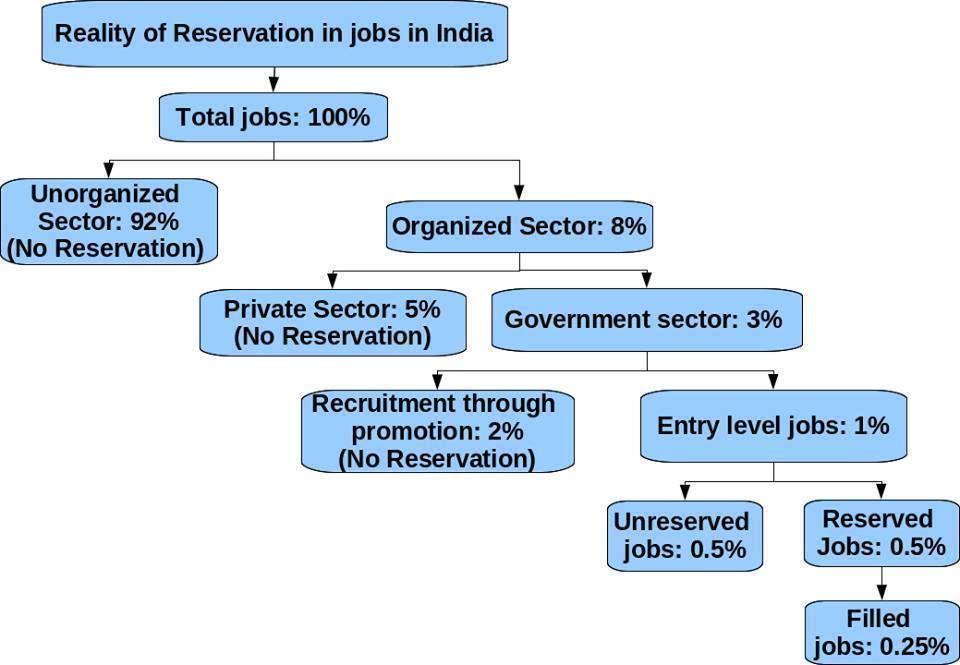
Basis and Significance of Reservation
In the recent debates on a reservation some people have suggested that let us now give reservation to so-called upper castes according to the percentage of their population. I do not agree with this argument. I think those who are mooting this idea are doing in frustration or out of their ignorance about the logic and basis of reservation. By even mooting this idea we dilute the principles of reservation and spread the idea that reservation can be granted to anyone. One should not forget and misunderstand the logic of reservation. There are very significant, fundamental and structural principles on the basis of which this reservation was conceded to SC, STs and to some OBCs after intense debates in the constituent assembly and centuries of movements by SCs, STs, and OBCs. Few of them were:
- They have faced thousands of years of exclusion and discrimination and were not accepted as even human beings.
- This exclusion and discrimination of thousands of years was cumulative in nature, that is, it was not in one aspect of life but it was in most of the spheres, for instance in social, economic, political, educational, religious, residential, occupational, etc.
- The founding fathers of the Indian nation thought that even after these people were accorded human rights enshrined in the democratic constitution of India and there will be penal provisions according to Indian Penal Code one will not be able to obliterate this exclusion and discrimination against these people and there should be some special provisions for them in the realm of Politics, Bureaucracy, and Education.
- There is an element of social justice in the reservation of SCs, STs, and OBCs. It involves historical corrective of injustices done to SCs and STS.
- There was no time limit fixed for reservation for SC and STs in Bureaucratic Jobs and in Educational Institutions. Only political reservation under article 330 and 332 of Indian Constitution, which reserves seats in Lok Sabha and in Vidhan Sabhas of different States were for 10 years. However, these reservations have been given new life with different amendments.
- The most important point is ‘Reservation for SCs and STs’ is directly connected with the issue of representation. It was because they did not have any representation in any sphere of life, that is, in social, economic, political, educational, etc. sphere for thousands of years and therefore they were supposed to get representation in these Institutions.
- Therefore, reservation is not a poverty alleviation programme. The founding fathers of the nation did not think to remove poverty of scheduled caste persons through reservations. In fact, there are so many poverty alleviation programmes begin to run in India. One such programme is MNREGA, the other is Prime Minister’s Rojgar Yojna etc. They always thought to grant SCs and STs Self-representation through the reservation.
In the light of the above, we cannot concede reservation to Upper Castes. Second, we cannot concede reservations on an economic basis.
By – Prof. Vivek Kumar, JNU

The reality of Reservation in India


Prof. Vivek Kumar’s reservations against reservations to all have sound footing when we take representation as reservation! But what if we take reservation as representation and that too proportional representation? If we take all resources and offices have to be proportionately distributed once which will in force for a period of ten years unaltered. After ten years excepting offices (public and private) the material resources will be garnered on the basis of work and the so called merit. In any case this will not happen as the ruling class, dominant castes or whatever you may call are not fools! What would be the (imaginary) outcome of this? Let’s try to picture this out:
1. As Babasaheb proposed entire land will be taken over by the state and parceled out (of course his schema is changed here) to people in proportion to their population.
2. Offices, private and public, will be distributed proportionately. It means every caste (applicable to sub castes also) will hold the number of offices exactly in proportion to their caste strength. Naturally, till the proportion is achieved the castes whose members hold offices disproportionate to the % of their population cannot be recruited till this asymmetry is balanced! Lo and behold! Brahmins cannot become priests for another 50 years – half a century from the time the new scheme is introduced. All political parties’ office bearers, ministers and all the political dignitaries from dominant castes vanish like thin air!
3. Dominant castes move heaven and earth to restore status-quo-ante. The suppressed castes will not let go the new freedom! The outcome can be:
a) The great transition of Indian socioeconomic and sociocultural milieu adjusts itself and gradually caste will give way to European type of class structure.
b) A bloody civil war will ensue. Neutral elements will be more and Muslims are expected to join the subalterns or at least maintain neutrality. This will result in the triumph of change.
4. Priestly class will vanish once its primary religious power ceases. In all the religions of the world except Hinduism any person (unfortunately only men) can be a priest irrespective of race or colour. Obviously, caste and pollution and purity attached to caste also become redundant; change solidifies.
5. The biggest beneficiary of this cloud-cuckoo-land will be BCs. Since the number is huge dominant castes cannot fight with them. Their aligning with BCs is also impossible, as that will dilute the gains BCs secured in the new redistribution.
6. Since the established industries, etc., cannot be taken away from the existing people the only way out is to debar them from contracts till the subaltern people attain some parity in economic life of the country.
This is all too good to be true! So either reservation to all castes or proportional representation can no more than an ideal construct.